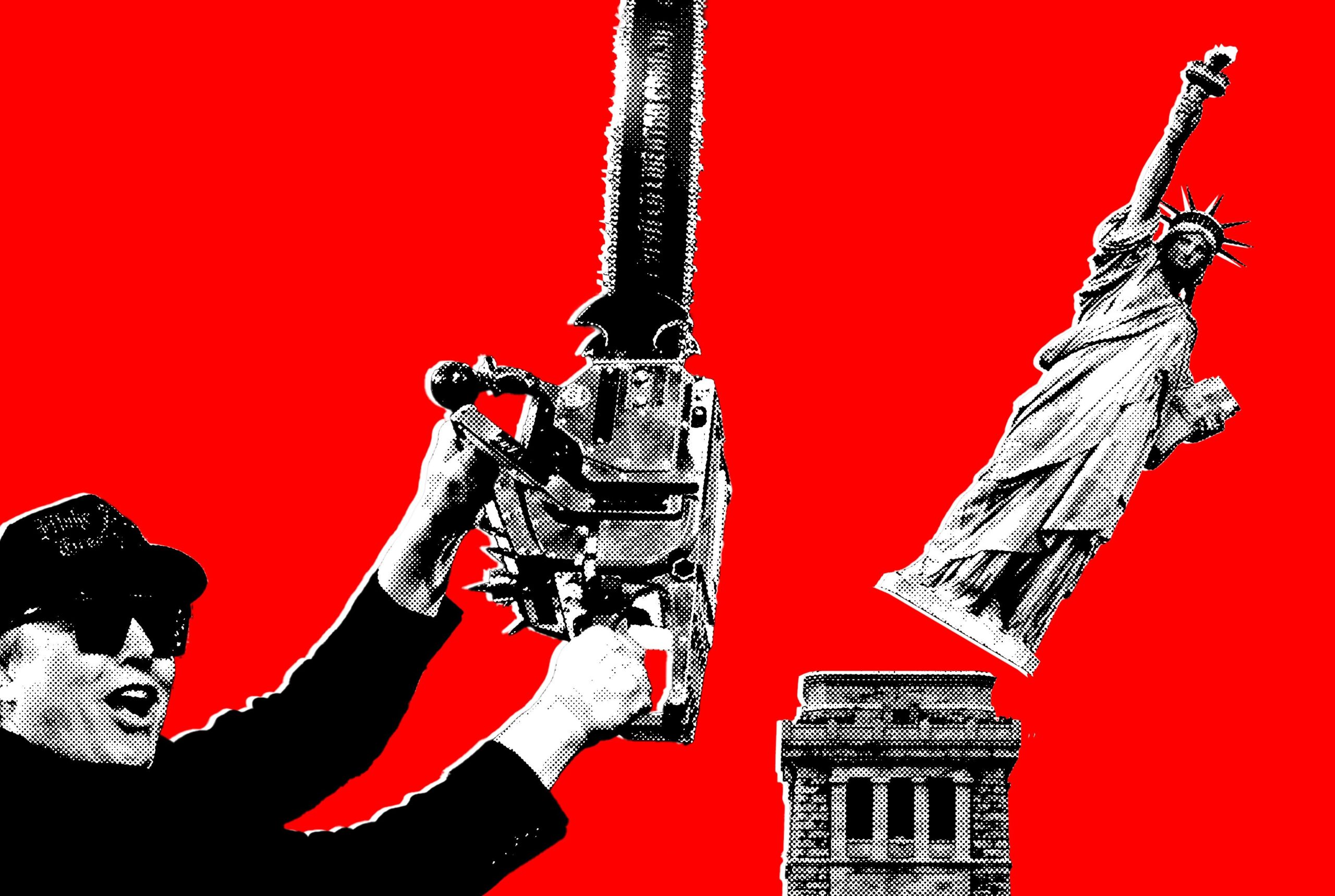What to make of the so-called Department of Government Efficiency at this stage of the Trump administration? Elon Musk has purportedly stepped away from his government duties. Courts are trying to strike down some of DOGE’s most egregious efforts. It may seem as though the worst excesses of DOGE have passed, replaced by something closer to a stasis.
This isn’t true. Not even close.
While the image of DOGE most likely burned into your retina is that of Elon Musk wielding a literal chain saw, the theatrics belie an organization that has quietly permeated all corners of the federal government. More than that, it’s increasingly clear that its objectives are now indistinguishable from that of the broader Trump administration. Removing DOGE at this point would be like trying to remove a drop of food coloring from a glass of water.
And what is it doing from its perch? Not loudly, clumsily attempting to fire thousands of government employees, but working in secrecy to collect, combine, and analyze data that was never intended to comingle. Using that information to find and surveil immigrants. Giving the Justice Department an assist on alleged voter fraud indictments.
Even if Musk claims he’s stepping away—though he met with House Republicans just this week—his lieutenants are still firmly in place at the agencies that control the federal workforce and regulate his companies. DOGE is reportedly using his xAI Grok chatbot to parse sensitive data, which potentially means millions of Americans’ personal information is doubling as training data for the model. A 19-year-old who goes by Big Balls online is still a central figure.
Meanwhile, the victories against DOGE may be short-lived. The Trump administration used it as a battering ram to push its policies through with overwhelming force. While the courts have held firm in some cases—just this week, a judge declared DOGE’s takeover of the United States Institute of Peace to be unlawful—the policies still exist, and there are other ways to achieve them. The Wall Street Journal reported recently that director of the White House Office of Management and Budget Russell Vought would pick up DOGE’s cost-cutting mantle in the post-Musk era. Expect him to wield not a hammer but a finely edged blade.
This has always been the plan. Vought is the architect of Project 2025, the policy road map that DOGE has been following turn by turn. He has been explaining for months what happens after DOGE’s first assault.
“We’re going to use all of our executive tools to make those savings permanent,” Vought said in an interview with Fox Business anchor Larry Kudlow on March 11. “We’re going to do everything we can to make sure that those are not merely something that goes on a website, but becomes permanent … We’ll work with Congress to do it, but we’ve also been aware the extent to which Congress has had a hard time passing cuts of any magnitude, and so what we want to do is everything we can to use presidential tools to bank those savings home.”
The only part of this that hasn’t gone to plan is that Congress may be more amenable than Vought gave it credit for; the House of Representatives managed to pass Donald Trump’s One Big Beautiful Bill this week, complete with provisions that cut the social safety net into ribbons.
In some ways, DOGE is even more dangerous when it’s boring. It has always been a tool, not an engine unto itself. It’s no longer useful to think of it as a separate entity, as a tech billionaire’s personal strike force. It’s a means to an end, one part of a larger project to gut the federal government and redefine the social contract. It’s important to keep a close eye on DOGE, to continue shining a light on what it does in the dark. But never lose sight of that project. A fool with a chain saw is nothing compared to the full power of the state.
The Chatroom
What do you think comes next with DOGE and Elon Musk?
Leave a comment on the site or send your thoughts to mail@wired.com.
WIRED Reads
• DOGE Used a Meta AI Model to Review Emails From Federal Workers: Materials viewed by WIRED show that DOGE affiliates within the Office of Personnel Management tested and used Meta’s Llama 2 model to review responses to the infamous “Fork in the Road” email.
• FEMA Has Canceled Its 4-Year Strategic Plan Ahead of Hurricane Season: Multiple FEMA employees tell WIRED that they did not know of another time when a strategic plan was rescinded without another in place.
• What It’s Like to Interview for a Job at DOGE: WIRED spoke with someone who applied for a job at Elon Musk’s so-called DOGE and discussed the five-step hiring process.
Want more? Subscribe now for unlimited access to WIRED.
What Else We’re Reading
🔗 Trump Administration Says It Is Halting Harvard’s Ability to Enroll International Students: This is a massive escalation in the Trump administration’s assault on universities. (The New York Times)
🔗 Musk’s DOGE Expanding His Grok AI in US Government, Raising Conflict Concerns: DOGE will apparently soon be using Elon Musk’s AI chatbot Grok to analyze federal government data. No conflict here, of course. (Reuters)
🔗 The Case of the ‘Lost’ FOIA Requests: A few months ago, a number of FOIA requests at federal agencies were lost. The data was compromised or deleted by two convicted hackers. (Bloomberg)
The Download
This week on our flagship Uncanny Valley podcast, Katie Drummond, Lauren Goode, and Michael Calore debated whether using AI in school is actually cheating. Listen now.
Thanks again for subscribing. You can find me on Bluesky or on Signal at barrett.64.
This is an edition of the WIRED Politics Lab newsletter. Read previous newsletters here.




